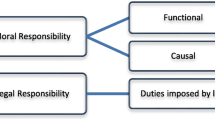Abstract
In this paper, the issue of plant closings is analyzed from the perspective of halakhah (the Written Law of Judaism). Two levels of analysis in halakhah must be differentiated: the legal (enforced by courts) and the moral (not enforced by law, but rather framed in terms of duty to God). There is no legal mandate to keep an unprofitable plant open, but there are a number of moral imprecations (particularly "acting more generously than the law requires") that might influence an employer's decision making. Using analogical reasoning to infer moral and/or legal obligations may be a fruitful means for businesspeople to analyze business situations in terms of ethical implications.
Similar content being viewed by others
References
Abohav, Rabbeinu Y.: 1982, Menoras Hamaor: The Mitzvah of Tzedakah, trans. Rabbi Yaakov Yosef Reinman (Markham Printing, Freehold, NJ).
Bleich, J. D.: 1983, Contemporary Halakhic Problems (Yeshiva University Press, New York).
Elon, M.: 1994, Jewish Law: History, Sources, Principles, trans. Bernard Auerbach and Melvin J. Sykes (The Jewish Publication Society, Philadelphia).
Friedman, M.: 1962/1982, Capitalism and Freedom (University of Chicago Press, Chicago).
Green, R. M.: 1997, ‘Guiding Principles of Jewish Business Ethics’, Business Ethics Quarterly 7, 21–30.
Jung, L. and A. Levine: 1987, Business Ethics in Jewish Law (Hebrew Publishing Company, Brooklyn).
Lansing, P. A. and H. J. Van Buren III: 1993, ‘Downsizing: Is There an Ethical Dimension to a Partial Plant Closing?’, Labor Law Journal 44, 698–707.
Lintz, M. G.: 1984, There' No Business Like the Torah' Business (Netzach, North Hollywood).
Maimonides: 1979, The Code of Maimonides, trans. by Isaac Klein (Yale University Press, New Haven).
Pava, M. L.: 1996, ‘The Talmud and Business Responsibilities,’ Journal of Business Ethics 15, 941–950.
Raday, F.: 1989, ‘Status and Contract in the Employment Relationship’, Israel Law Review 23, 77–110.
Roth, J.: 1986, The Halakhic Process: A Systematic Process (Jewish Theological Seminary Press, New York).
Tamari, M.: 1987, With All Your Possessions (The Free Press, New York).
Tamari, M.: 1995, The Challenge of Wealth (Jason Aronson Inc., Northvale, NJ).
Wagschal, Rabbi S.: 1990, A Torah Guide to the Businessman (Feldheim Publishers, New York).
Zipperstein, E.: 1983, Business Ethics in Jewish Law (Ktav Publishing House, New York).
Author information
Authors and Affiliations
Rights and permissions
About this article
Cite this article
Van Buren, H.J. Acting More Generously than the Law Requires: The Issue of Employee Layoffs in halakhah. Journal of Business Ethics 19, 335–343 (1999). https://doi.org/10.1023/A:1005976531062
Issue Date:
DOI: https://doi.org/10.1023/A:1005976531062




